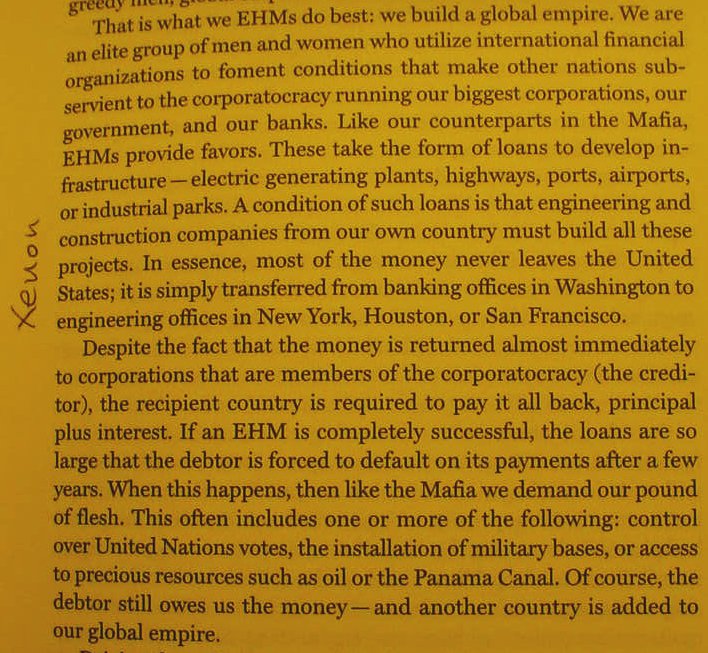I first heard of Confessions of an Economic Hit Man (EHM) on
Democracy
NOW!, when the author, John Perkins, was being interviewed by Amy
Goodman about it. He was explaining that he watched the aftermath of
the 9/11 attacks and realized that most Americans just didn't know what
has been done on the international stage in their name. He wrote the
book to tell the story, despite the fact there are lots of people who
didn't want him to. He knows about it because he was one of the people
that milked every opportunity for whatever it was worth, leaving behind
a string of bankrupt governments and polluted landscapes. I got all
that from the radio, and thought no more about it. Then my old friend
the TDM loaned me his copy, saying "it reads like a good novel." Once I
started I had trouble putting the thing down.
The story begins in New England, where he was trained to say whatever
it took to land lucrative contracts for the consulting company he
worked for (MAIN) building infrastructure for developing countries.
They would then subcontract to the many engineering firms like Bechtel
that did the actual work of building electric power plants and the
like. He did this knowing full well that paying for the resulting
oversized equipment would surely bankrupt the national treasury, making
the country a financial slave of the World Bank and its friends.
He goes through this process many times, in places like Indonesia,
Columbia, and Iran. Then after the oil shocks of the 1970s, he worked
on a project to repatriate those petrodollars by rebuilding Saudi
Arabia. Over and over during the course of the book he discusses his
feelings about the net impact of what he was doing. Sometimes he even
allows a particularly talented politician like Omar Torrijos to talk
him out of projecting wildly optimistic numbers, despite the grumbling
from his management this caused. By the end of the story, it is clear
the guy caused more grief with his reports than just about any mass
murderer I ever heard of did with a gun.
To his credit, the author was bothered enough by what he was doing to
quit the field. He ends the book by explaining that yes, the story is
old but the issues raised are politically significant and will continue
to be so. He looks at what companies like Nike are doing, making shoes
in third world sweatshops, as a continuation of that work. He thinks of
the 2nd Bush Presidency in the same vein. He explains that people go
along with it for many reasons. The patterns of abuse are so simple and
easy to understand I almost think that a widespread understanding of
how they work will go a long way towards preventing them from working.
Reading this book can certainly help with that.
Tian Harter
Here is an excerpt that I particularly think tells the story:

I talked to a woman who also liked the book. She said "Now I know where
all that third world debt came from."

